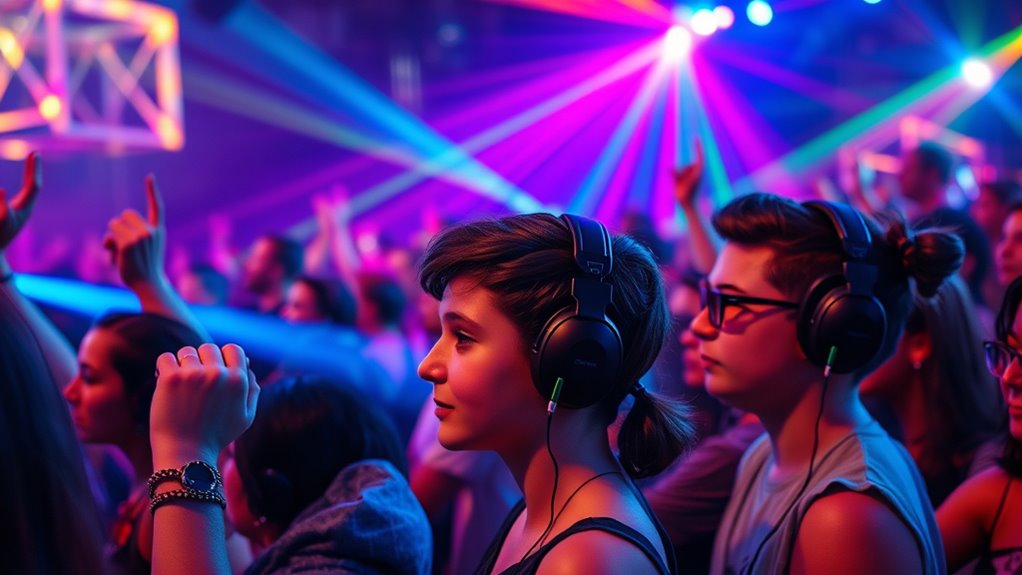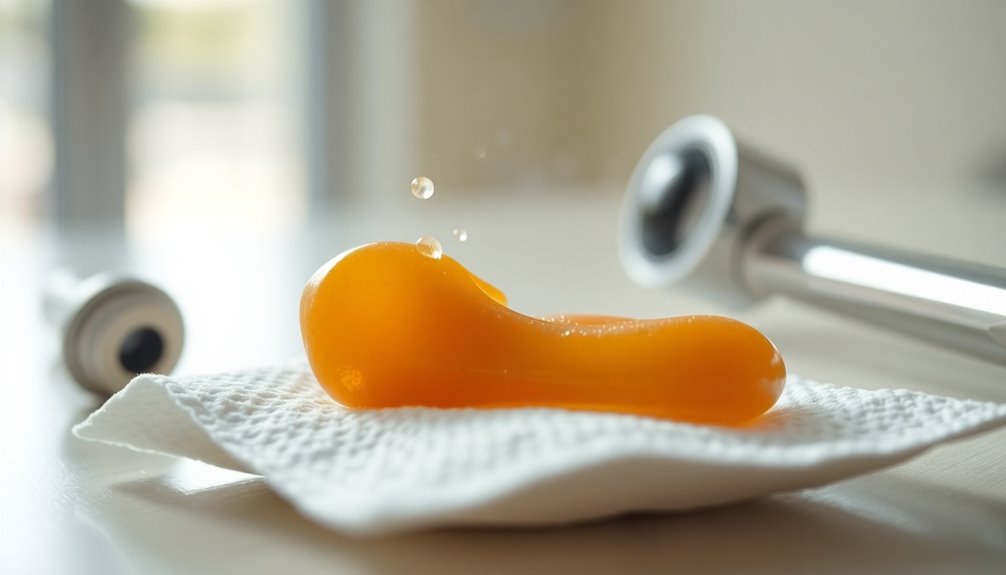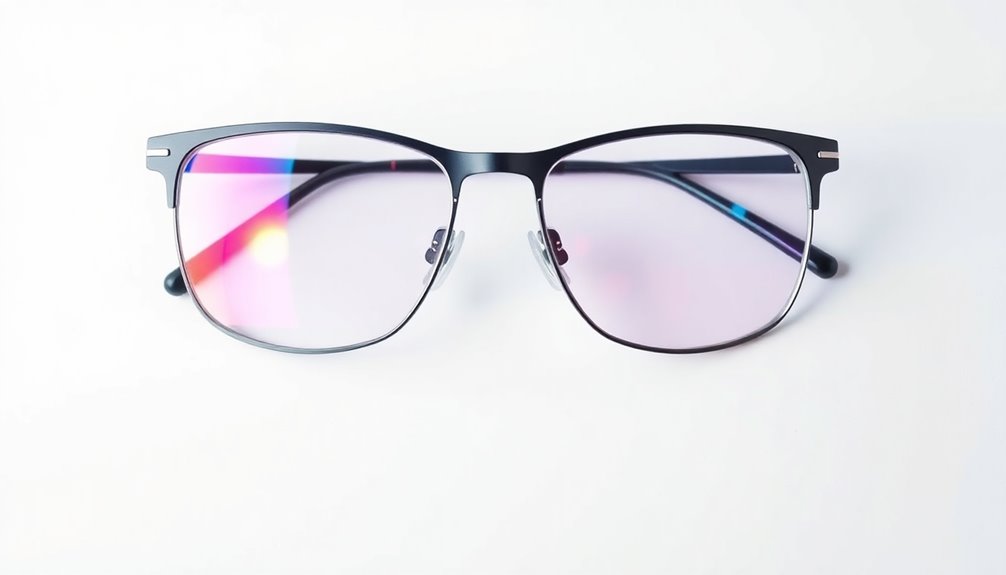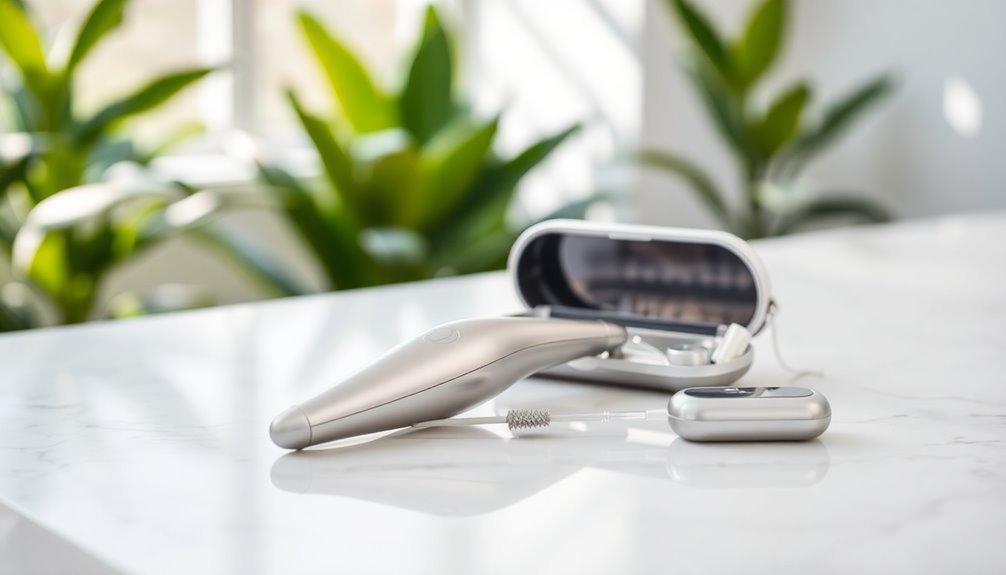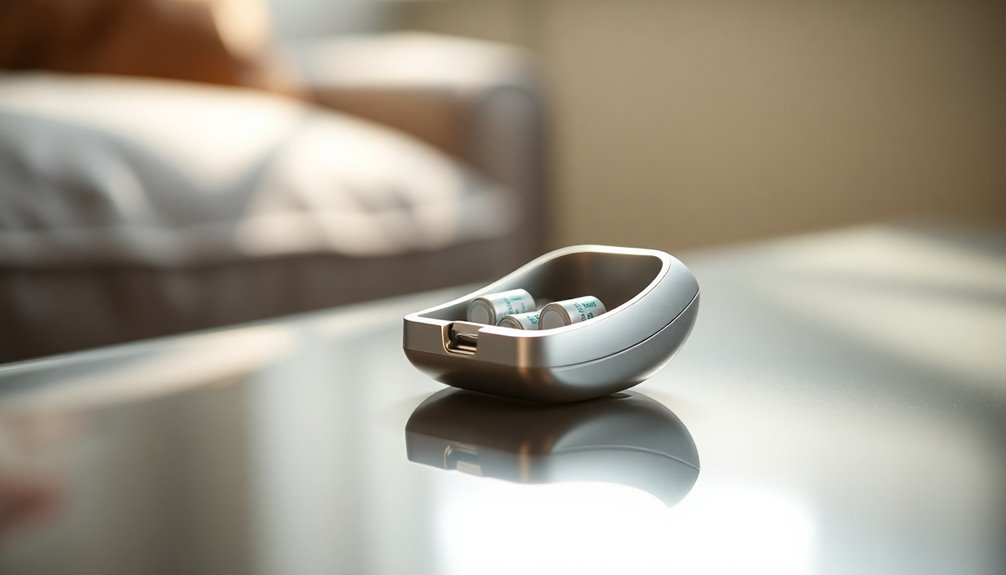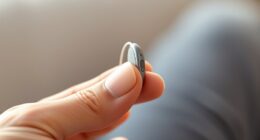At concerts and festivals, protect your hearing by wearing properly fitted earplugs or earmuffs designed for high noise levels. Limit your exposure time, take regular breaks in quieter areas, and avoid standing near speakers. Keep your ear protection clean and replace it if damaged. By managing your sound environment and knowing how to safeguard your ears, you can enjoy live music safely. More helpful tips await to help you stay sound-sensitive in loud settings.
Key Takeaways
- Always wear appropriate ear protection, like earplugs or earmuffs, to reduce exposure to dangerous loud noises.
- Choose quieter locations and avoid standing near speakers or loud crowds to minimize sound levels.
- Take regular breaks in quiet areas—every 30 minutes to 2 hours—to give your ears time to recover.
- Properly insert, clean, and store reusable ear protection to maintain effectiveness and hygiene.
- Monitor for signs of hearing fatigue, such as ringing or muffled sounds, and respond by increasing breaks or relocating.
Understanding the Risks of Loud Music
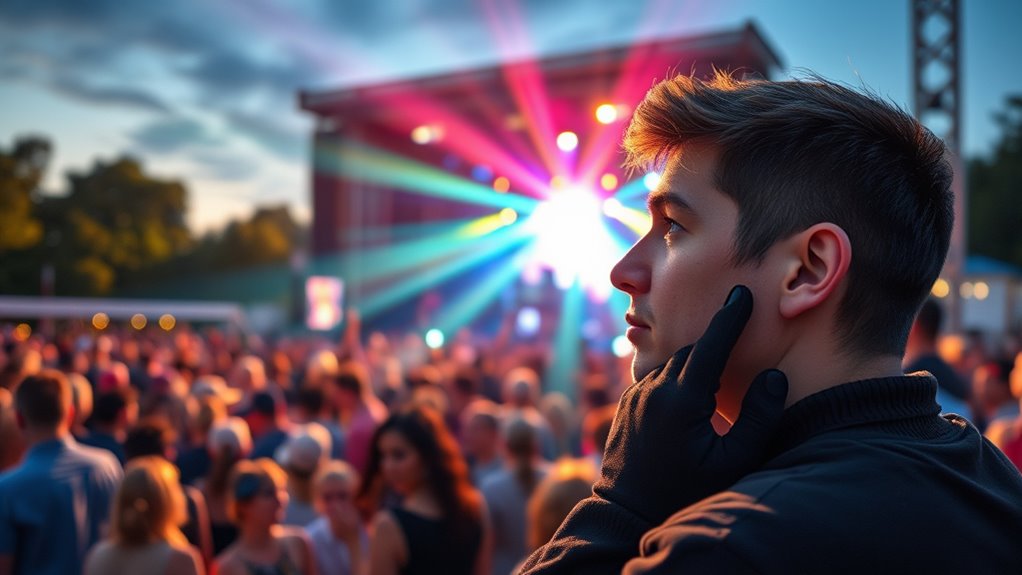
Have you ever wondered how loud music can harm your hearing? When you’re exposed to high volumes, your inner ear’s delicate hair cells can get damaged. This damage accumulates over time, leading to permanent hearing loss. You might not notice the immediate effects, but repeated exposure to loud sounds can cause tinnitus — a ringing or buzzing in your ears. Concerts and festivals often reach dangerous decibel levels, sometimes exceeding 120 dB, which is enough to cause harm in just minutes. Even if you think you’re okay, the damage can happen silently and gradually. Protecting your hearing means understanding that loud music isn’t just a temporary annoyance; it’s a real threat to your auditory health. Proper ear protection like earplugs can significantly reduce the risk of damage during such events.
Choosing the Right Ear Protection

Choosing the right ear protection is essential to effectively reduce your risk of hearing damage in noisy environments. Start by considering the type of noise you’ll encounter; for concerts and festivals, earplugs or earmuffs designed for high decibel levels work best. Look for earplugs with a noise reduction rating (NRR) that suits the environment—higher NRR for louder venues. Reusable silicone or custom-molded earplugs often provide better comfort and sound clarity than foam plugs. If you’re sensitive to sound or want to hear music clearly, choose filtered earplugs that block harmful noise without muffling the entire sound. Always guarantee a proper fit—ear protection that doesn’t fit well won’t effectively reduce noise and might cause discomfort. Proper fit and comfort are crucial for effective hearing protection and a better concert experience. Picking the right protection keeps your ears safe without sacrificing your concert experience.
Proper Use and Maintenance of Earplugs

Once you’ve selected the appropriate earplugs, using and maintaining them correctly guarantees they continue to protect your hearing effectively. Proper use involves inserting them fully and comfortably, ensuring a good seal without discomfort. Regularly inspecting your earplugs for dirt, damage, or wear helps keep them effective. Clean reusable earplugs after each use with mild soap and water, and store them in a dry, protective case. For disposable types, replace them as recommended. Avoid sharing earplugs to prevent infections. Keep your hands clean before handling them. Additionally, being aware of air purifier maintenance dos and don’ts can help ensure your environment stays clean, which indirectly supports overall hearing health by reducing airborne irritants. By following these steps, you maintain ideal protection and extend the lifespan of your earplugs, ensuring your hearing stays safe at every concert or festival.
Strategies for Managing Noise Levels
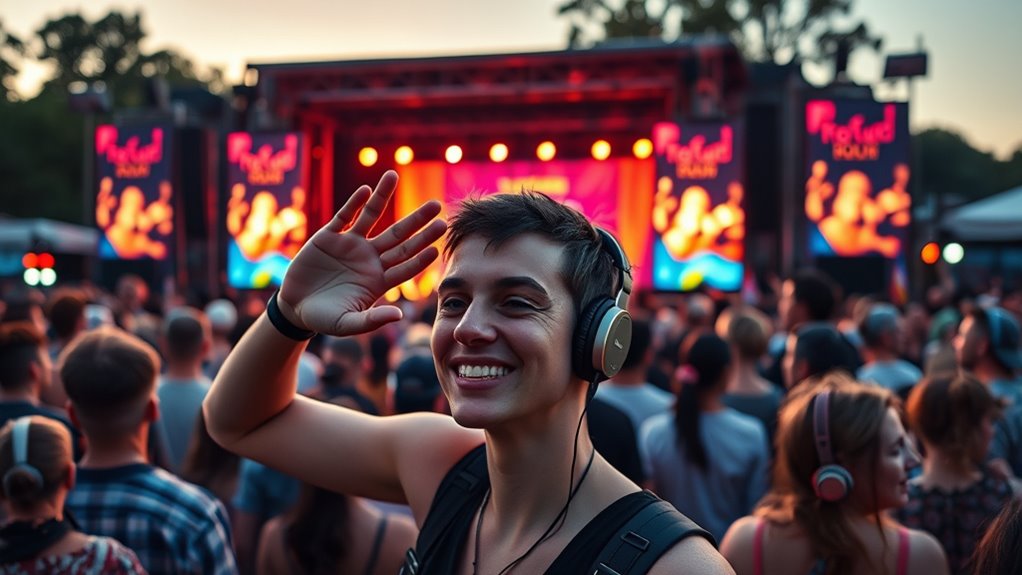
Controlling your exposure to loud noise is essential for protecting your hearing during concerts, festivals, and other noisy environments. To do this, stay aware of how loud the environment is and take steps to limit your time near speakers or loud sources. Use a noise level app or look for signs indicating excessive volume. When possible, take regular breaks in quieter areas to give your ears a rest. Keep a safe distance from the stage or speakers, which can markedly reduce sound intensity. Wearing ear protection, like earplugs, can further help manage noise exposure. Remember, being proactive about noise levels helps prevent long-term hearing damage, ensuring you enjoy the event without risking your hearing health. Additionally, understanding sound levels and their effects can help you make more informed choices about your safety measures.
Planning Your Attendee Experience for Ear Safety
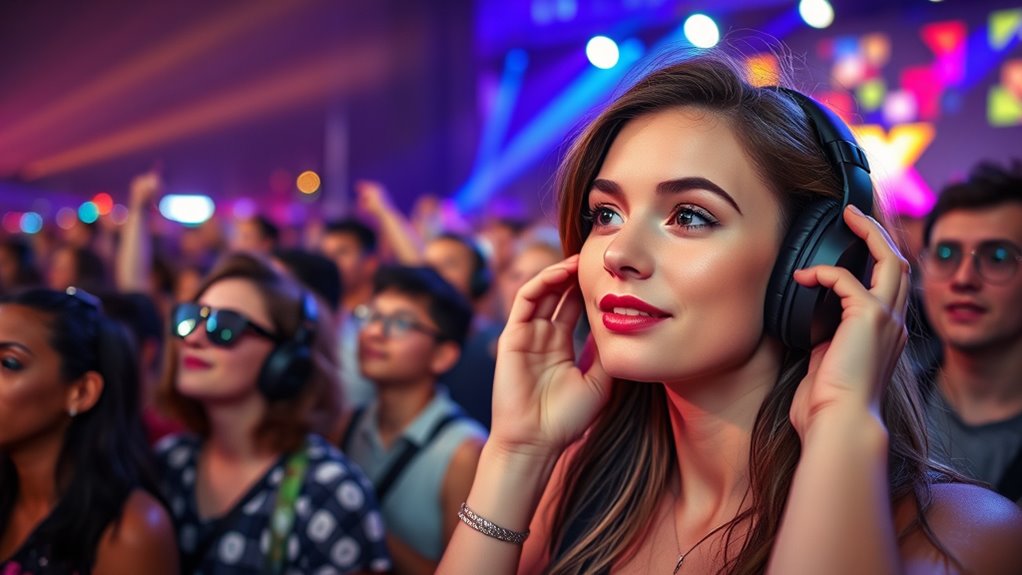
Planning your attendee experience with ear safety in mind guarantees you can enjoy loud events without risking your hearing. To do this effectively, consider these steps:
- Research event venues—know the sound levels and crowd size beforehand.
- Choose your position wisely—stay away from speakers and crowded areas.
- Bring protective gear like earplugs or noise-canceling headphones.
- Set time limits—plan breaks outside the loudest zones to give your ears a rest.
- Be aware of sound exposure guidelines to better understand safe listening limits.
Recognizing Symptoms of Hearing Fatigue and Damage
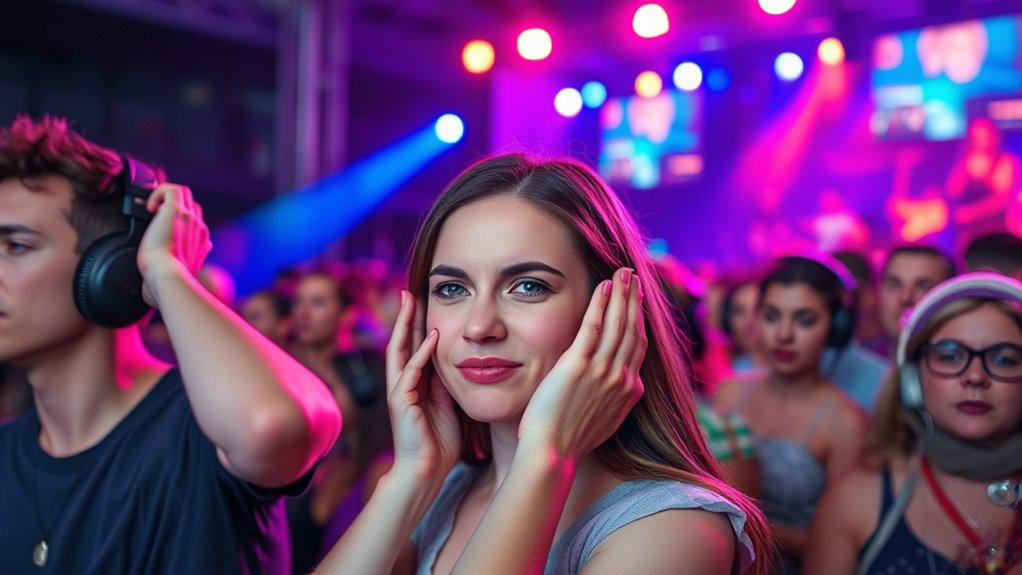
Being able to recognize the early signs of hearing fatigue and damage is crucial for protecting your ears during loud events. If you notice muffled sounds or difficulty understanding conversations afterward, your ears may be overstressed. Ringing or buzzing in your ears, known as tinnitus, is a clear warning sign of potential damage. You might also experience a feeling of fullness or pressure in your ears, which indicates overload. When these symptoms appear, it’s a sign to take a break from the noise and give your ears time to recover. Ignoring these early signs can lead to lasting hearing loss. Paying attention to how your ears feel and respond during and after loud events helps you take steps to prevent permanent damage. High volume levels can significantly contribute to hearing fatigue and long-term damage if not managed properly.
Long-Term Hearing Care and Regular Check-Ups
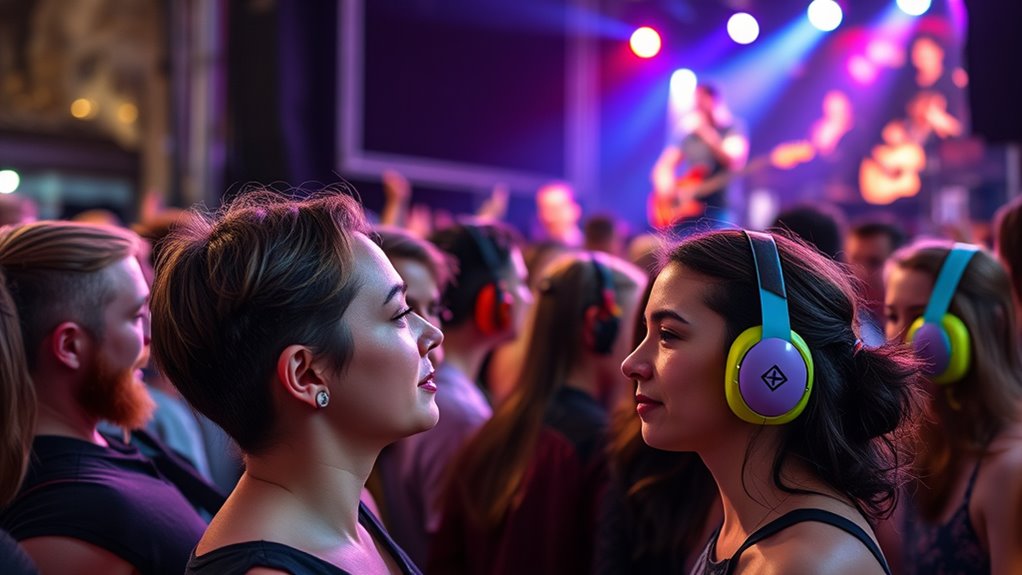
Regular hearing check-ups are essential to maintain your ear health over time. Visiting an audiologist regularly helps catch issues early before they worsen. These exams can identify subtle changes in your hearing, ensuring prompt treatment if needed. To maximize your long-term hearing care, consider these steps:
- Schedule annual or bi-annual hearing tests, especially if you attend loud events frequently.
- Use protective devices, like earplugs, consistently, even when hearing seems fine.
- Keep track of any changes or new symptoms and report them promptly.
- Maintain a healthy lifestyle—avoid smoking and manage loud noise exposure outside of concerts.
- Incorporating sound therapy science techniques, such as listening to specific frequencies, can support ongoing ear health and aid in recovery.
Taking these proactive measures helps preserve your hearing, allowing you to enjoy music and social activities for years to come.
Additional Tips for Protecting Your Hearing While Enjoying Live Events
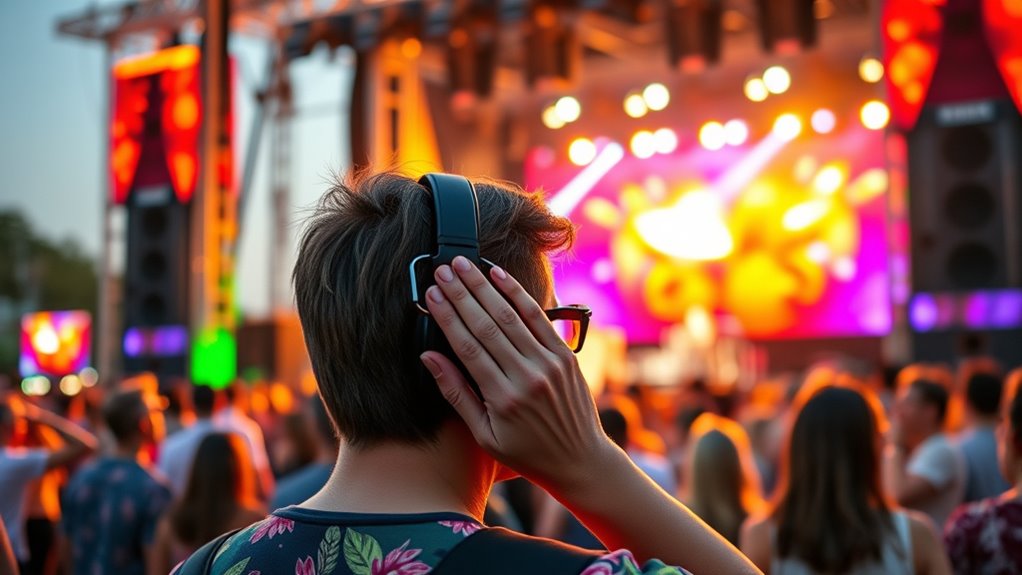
When attending live events, you can protect your hearing by using earplugs correctly to reduce loud noises. Limiting how long you stay and moving to quieter areas also helps prevent damage. These simple steps make enjoying concerts safer for your ears. Additionally, being aware of sound exposure limits can help you better manage your listening habits and further safeguard your hearing health.
Use Earplugs Effectively
To safeguard your hearing effectively at live events, using earplugs properly is vital. First, choose high-quality, musician’s earplugs that reduce volume without distorting sound. Always insert them fully into your ears, ensuring a snug fit to block out excess noise. Avoid removing or adjusting them frequently, which can reduce their effectiveness. Keep your earplugs clean and dry, replacing them if they become damaged or dirty. Finally, remember to remove your earplugs during quieter moments to give your ears a brief rest. Additionally, understand that headphone jacks are used in some hearing protection devices, so verify compatibility for optimal safety.
Here are some tips to maximize protection:
- Select earplugs designed for concerts
- Insert them correctly for a secure fit
- Keep them clean and in good condition
- Use them consistently throughout the event
Limit Exposure Duration
While using earplugs helps reduce sound levels, limiting how long you’re exposed to loud noise makes a significant difference in protecting your hearing. The longer you’re around intense sound, the greater the risk of damage. Set a timer to remind yourself to take breaks or step outside periodically. For example:
| Break Frequency | Duration of Exposure | Rest Periods |
|---|---|---|
| Every 30 minutes | 15-minute break | Quiet area for recovery |
| Every hour | 10-minute rest | Move to a less noisy spot |
| 2 hours max | 30-minute break | Avoid prolonged exposure |
Additionally, access to personalized work environments can boost your motivation to consistently protect your hearing and maintain overall well-being during live events.
Choose Quieter Areas
Choosing quieter areas at live events can substantially reduce your risk of hearing damage. By positioning yourself away from speakers and loud crowds, you protect your ears while still enjoying the show. Look for spots near the back of the venue or behind barriers, where sound levels tend to be lower.
Here are four tips to help you find quieter areas:
- Scout the venue beforehand to identify less crowded sections.
- Avoid front-row spots close to speakers.
- Choose seating or standing areas behind sound towers.
- Move around during the event to find spots with less noise.
Frequently Asked Questions
How Do I Choose the Best Type of Ear Protection for Concerts?
When choosing the best ear protection for concerts, consider your comfort and the level of noise reduction you need. Look for earplugs that specifically block out loud sounds but still let you enjoy the music clearly. Reusable silicone or custom-molded earplugs often offer a better fit and durability. Try different types to see what feels most comfortable and effective, ensuring your hearing stays safe while you have fun.
Are There Specific Brands of Earplugs Recommended for Festival-Goers?
When choosing earplugs for festivals, you want brands known for quality and noise reduction, like EARPRO, Alpine, or Hearos. These brands offer reusable or single-use options with high NRR ratings, ensuring effective protection while still letting you enjoy the music. Look for comfortable, discreet designs that fit well and don’t block out all sound. Your goal is to reduce volume without sacrificing the experience, so pick trusted, recommended brands.
What Are the Signs of Hearing Damage Immediately After an Event?
Did you know that over 15% of adults experience hearing loss from loud noise exposure? After a concert, you might notice ringing in your ears, called tinnitus, which can last hours or days. You could also feel muffled hearing or discomfort in your ears. These signs indicate immediate damage, so it is crucial to rest your ears and avoid loud environments to prevent permanent harm.
How Often Should I Get My Hearing Checked if I Attend Frequent Concerts?
If you attend concerts frequently, you should get your hearing checked at least once a year. Regular check-ups help catch early signs of damage, so you can take steps to protect your hearing. If you notice ringing, muffled sounds, or difficulty understanding speech, see an audiologist sooner. Staying proactive guarantees you preserve your hearing health and enjoy music without risking long-term damage.
Can Using Ear Protection Affect My Overall Concert Experience?
The proof is in the pudding—you might worry ear protection dulls the concert vibe, but it actually enhances your experience. Using earplugs or noise-canceling headsets keeps the sound clear and prevents ringing or damage afterward. Don’t worry about missing out; instead, you’ll enjoy the music without risking your hearing. Protecting your ears lets you stay in the moment and fully appreciate the concert’s energy.
Conclusion
By taking simple steps to protect your hearing, you can dance all night without missing a beat later. It’s funny how a small pair of earplugs can make such a big difference—keeping the music loud and your hearing safe. So, next time you’re at a concert or festival, remember: your ears are your lifelong ticket to enjoying music. Protect them now, and they’ll thank you for years to come.
